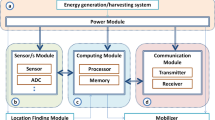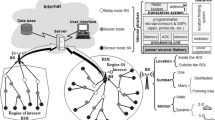Abstract
Recent studies in wireless sensor networks (WSN) have observed that the irregular link quality is a common phenomenon, rather than an anomaly. The irregular link quality, especially link asymmetry, has significant impacts on the design of WSN protocols. In this paper, we propose two asymmetry-aware link quality services: the neighborhood link quality service (NLQS) and the link relay service (LRS). The novelty of the NLQS service is taking the link asymmetry into consideration to provide timeliness link quality and distinguishing the inbound and outbound neighbors with the support of LRS, which builds a relay framework to alleviate the effects of link asymmetry. To demonstrate the proposed link quality services, we design and implement two example applications, the shortest hops routing tree (SHRT) and the best path reliability routing tree (BRRT), on the TinyOS platform. We found that the performance of two example applications is improved substantially. More than 40% of nodes identify more outbound neighbors and the percentage of increased outbound neighbors is between 14% and 100%. In SHRT, more than 15% of nodes reduce hops of the routing tree and the percentage of reduced hops is between 14% and 100%. In BRRT, more than 16% of nodes improve the path reliability of the routing tree and the percentage of the improved path reliability is between 2% to 50%.
Preview
Unable to display preview. Download preview PDF.
Similar content being viewed by others
References
Ganesan, D., Krishnamachari, B., Woo, A., Culler, D., Estrin, D., Wicker, S.: Complex behavior at scale: An experimental study of low-power wireless sensor networks. Technical Report UCLA/CSD-TR-02-0013, University of California, Los Angeles (2002)
Seada, K., Zuniga, M., Helmy, A., Krishnamachari, B.: Energy-efficient forwarding strategies for geographic routing in lossy wireless sensor networks. In: Proceedings of SenSys 2004 (2004)
Woo, A., Tong, T., Culler, D.: Taming the underlying challenges of reliable multihop routing in sensor networks. In: Proceedings of SenSys 2003 (2003)
Zhao, J., Govindan, R.: Understanding packet delivery performance in dense wireless sensor networks. In: Proceedings of SenSys 2003 (2003)
Zhou, G., He, T., Krishnamurthy, S., Stankovic, J.A.: Impact of radio irregularity on wireless sensor networks. In: Proceedings of MobiSys 2004 (2004)
Zuniga, M., Krishnamachari, B.: Analyzing the transitional region in low power wireless links. In: Proceedings of SECON 2004 (2004)
Levis, P., et al.: The emergence of networking abstractions and techniques in tinyos. In: Proceedings of NSDI 2004 (2004)
Woo, A., Culler, D.: Evaluation of efficient link reliability estimators for low-power wireless networks. Technical Report UCB/CSD-03-1270, University of California, Berkeley (2003)
Levis, P., Lee, N., Welsh, M., Culler, D.: Tossim: Accurate and scalable simulation of entire tinyos applications. In: Proceedings of SenSys 2003 (2003)
Du, J., Shi, W., Sha, K.: Asymmetry-aware link quality services in wireless sensor networks. Technical Report MIST-TR-2005-006, Wayne State University (2005)
Cerpa, A., Wong, J., Kuang, L., Potkonjak, M., Estrin, D.: Statistical model of lossy links in wireless sensor networks. Technical Report CENS Technical Report, University of California, Los Angeles (2004)
Ramasubramanian, V., Mosse, R.C.: Providing a bidirectional abstraction for unidirectional ad hoc networks. In: Proceedings of INFOCOM 2002 (2002)
Author information
Authors and Affiliations
Editor information
Editors and Affiliations
Rights and permissions
Copyright information
© 2005 Springer-Verlag Berlin Heidelberg
About this paper
Cite this paper
Du, J., Shi, W., Sha, K. (2005). Asymmetry-Aware Link Quality Services in Wireless Sensor Networks. In: Yang, L.T., Amamiya, M., Liu, Z., Guo, M., Rammig, F.J. (eds) Embedded and Ubiquitous Computing – EUC 2005. EUC 2005. Lecture Notes in Computer Science, vol 3824. Springer, Berlin, Heidelberg. https://doi.org/10.1007/11596356_74
Download citation
DOI: https://doi.org/10.1007/11596356_74
Publisher Name: Springer, Berlin, Heidelberg
Print ISBN: 978-3-540-30807-2
Online ISBN: 978-3-540-32295-5
eBook Packages: Computer ScienceComputer Science (R0)




